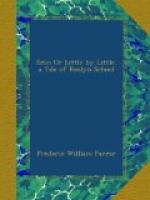SOWING THE WIND
“Praepediuntur
Crura vacillanti, tardescit
lingua, madet mens,
Nant oculi.”
LUCR. iii. 417.
Next evening, when preparation began, Pietrie and Graham got everything ready for a carouse in their class-room. Wildney, relying on the chance of names not being called over (which, was only done in case any one’s absence was observed), had absented himself altogether from the boarders’ room, and helped busily to spread the table for the banquet. The cook had roasted for them the fowls and pigeons, and Billy had brought an ample supply of beer and some brandy for the occasion. A little before eight o’clock everything was ready, and Eric, Attlay, and Llewellyn were summoned to join the rest.
The fowls, pigeons, and beer had soon vanished, and the boys were in the highest spirits. Eric’s reckless gaiety was kindled by Wildney’s frolicsome vivacity, and Graham’s sparkling wit; they were all six in a roar of perpetual laughter at some fresh sally of fun elicited by the more phlegmatic natures of Attlay or Llewellyn, and the dainties of Wildney’s parcel were accompanied by draughts of brandy and water, which were sometimes exchanged for potations of the raw liquor. It was not the first time, be it remembered, that the members of that young party had been present at similar scenes, and even the scoundrel Billy was astonished, and alarmed occasionally at the quantities of spirits and other inebriating drinks that of late had found their way to the studies. The disgraceful and deadly habit of tippling had already told physically on both Eric and Wildney. The former felt painfully that he was losing his clear-headedness, and that his intellectual tastes were getting not only blunted but destroyed; and while he perceived in himself the terrible effects of his sinful indulgence, he saw them still more indisputably in the gradual coarseness which seemed to be spreading, like a grey lichen, over the countenance, the mind, and the manners of his younger companion. Sometimes the vision of a Nemesis breaking in fire out of his darkened future, terrified his guilty conscience in the watches of the night; and the conviction of some fearful Erynnis, some discovery dawning out of the night of his undetected sins, made his heart beat fast with agony and fear. But he fancied it too late to repent. He strangled the half-formed resolutions as they rose, and trusted to the time when, by leaving school, he should escape, as he idly supposed, the temptations to which he had yielded. Meanwhile, the friends who would have rescued him had been alienated by his follies, and the principles which might have preserved him had been eradicated by his guilt. He had long flung away the shield of prayer, and the helmet of holiness, and the sword of the Spirit, which is the word of God; and now, unarmed and helpless, Eric stood alone, a mark for the fiery arrows of his enemies, while, through the weakened inlet of every corrupted sense, temptation rushed in upon him perpetually and unawares.




